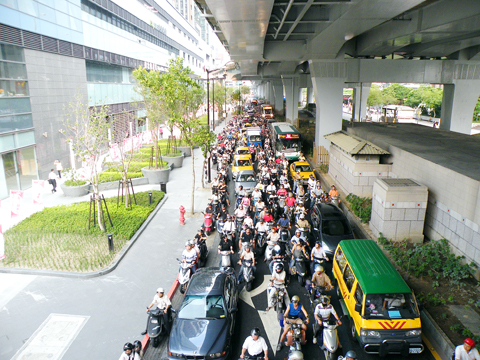The new Taipei Bus Station, the biggest bus terminal in the city, opened yesterday amid concerns that increased traffic would exacerbate congestion on Huayin Street, Chengde Road and Civic Boulevard.
The station, located at the intersection of Chengde Road and Huayin Street, will serve as the main transportation hub for 10 bus companies running 39 routes to Ilan County and cities, as well as counties south of Hsinchu.
Five other bus companies providing 10 routes to Taoyuan County and cities and counties north of Taoyuan will continue to use the old bus station on Chongqing N Road.

PHOTO: HUNG MIN-LUNG, TAIPEI TIMES
No serious traffic jams were reported around the station yesterday.
Liang Heng-de (梁恒德), assistant director of the Department of Transportation’s public transportation office, said the department and all bus companies had held a trial run during the past two months, which accounted for the smooth launch of operations.
The Traffic Police Division dispatched about 40 traffic police to the area to prevent traffic jams.
Most passengers taking buses at the station yesterday welcomed the comfortable environment of the new station, but complained about unclear signs.
“It took us a while to find the entrance to the station and we had to walk a long way from Taipei Main Station to take a bus here. It is quite inconvenient,” a female passenger surnamed Lin said.
Chinese Nationalist Party (KMT) Taipei City Councilor Chen Yu-mei (陳玉梅) expressed her concerns about serious traffic congestion around the station during weekends and rush hour, as several hundred buses would be entering and exiting the station every day, increasing traffic on the already crowded Chengde Road and Civic Boulevard.
Commissioner of the transportation department Luo Shiaw-shyan (羅孝賢) said the city would enforce overpass entrance controls on Civic Boulevard and other measures to avoid problems.
The bus station has 30 ticketing counters on the first floor and 32 platforms on the second, third and fourth floors. The 24-story building also features a shopping area, movie theater and hotel, which are scheduled to open next month.
To celebrate the opening of the station, the underground parking lot on Civil Boulevard will be free for scooters until Sept. 10.

SHIPS, TRAINS AND AUTOMOBILES: The ministry has announced changes to varied transportation industries taking effect soon, with a number of effects for passengers Beginning next month, the post office is canceling signature upon delivery and written inquiry services for international registered small packets in accordance with the new policy of the Universal Postal Union, the Ministry of Transportation and Communications said yesterday. The new policy does not apply to packets that are to be delivered to China, the ministry said. Senders of international registered small packets would receive a NT$10 rebate on postage if the packets are sent from Jan. 1 to March 31, it added. The ministry said that three other policies are also scheduled to take effect next month. International cruise ship operators

NUMBERS IMBALANCE: More than 4 million Taiwanese have visited China this year, while only about half a million Chinese have visited here Beijing has yet to respond to Taiwan’s requests for negotiation over matters related to the recovery of cross-strait tourism, the Tourism Administration said yesterday. Taiwan’s tourism authority issued the statement after Chinese-language daily the China Times reported yesterday that the government’s policy of banning group tours to China does not stop Taiwanese from visiting the country. As of October, more than 4.2 million had traveled to China this year, exceeding last year. Beijing estimated the number of Taiwanese tourists in China could reach 4.5 million this year. By contrast, only 500,000 Chinese tourists are expected in Taiwan, the report said. The report

The Forestry and Nature Conservation Agency yesterday launched a gift box to market honey “certified by a Formosan black bear” in appreciation of a beekeeper’s amicable interaction with a honey-thieving bear. Beekeeper Chih Ming-chen (池明鎮) in January inspected his bee farm in Hualien County’s Jhuosi Township (卓溪) and found that more than 20 beehives had been destroyed and many hives were eaten, with bear droppings and paw prints near the destroyed hives, the agency said. Chih returned to the farm to move the remaining beehives away that evening when he encountered a Formosan black bear only 20m away, the agency said. The bear

Chinese embassy staffers attempted to interrupt an award ceremony of an international tea competition in France when the organizer introduced Taiwan and displayed the Republic of China flag, a Taiwanese tea farmer said in an interview published today. Hsieh Chung-lin (謝忠霖), chief executive of Juxin Tea Factory from Taichung's Lishan (梨山) area, on Dec. 2 attended the Teas of the World International Contest held at the Peruvian embassy in Paris. Hsieh was awarded a special prize for his Huagang Snow Source Tea by the nonprofit Agency for the Valorization of Agricultural Products (AVPA). During the ceremony, two Chinese embassy staffers in attendance